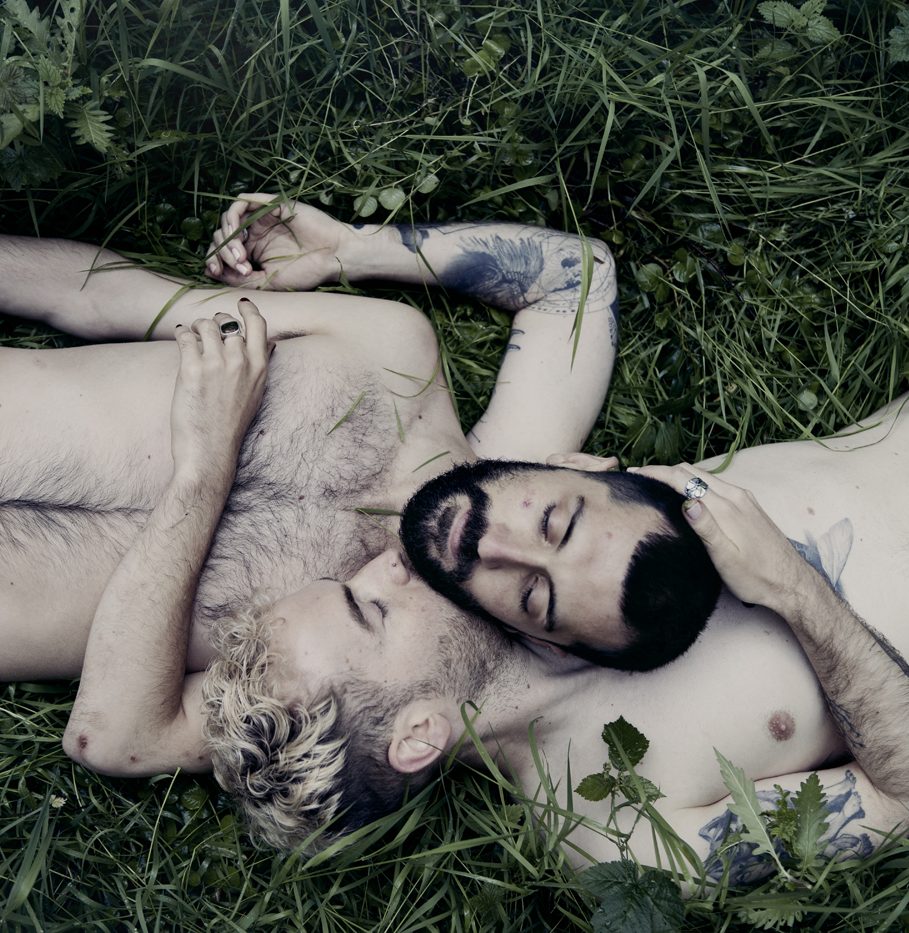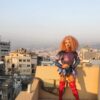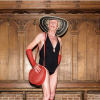The couple met when they worked on a theatre production together, sharing a caravan for three weeks. That turned out nicely.
Words by Caspar Pisters, photos by Paul Sixta
Cruising and hook-up culture are the subjects of Grindr Diaries, a thumping and upbeat new track from musician Jórma (real name Jonathan Bonny). The steamy video – filmed by Paul Sixta; lotsa sexy naked people – is choreographed by his boyfriend Manuel (Manu) Kiros Paolini.
“Working together is actually how we met”, says Manu. “I was doing an internship in Groningen, at Club Guy & Roni, Jonathan with Slagwerk Den Haag.”
Jonathan: “Which is a music group, they often collaborate. So we were both stagiaires, kind of in the same situation, living the in the same building.”
M: “They teamed us up for a production in Bos Theater in Amsterdam, outdoors during Summer. We had to stay in a caravan together for three weeks. We didn’t know each other.”
J: “There was no budget for any kind of proper accommodation, the only solution they could find was small caravans.”
M: “The group of dancers already knew each other. Jonathan was the new element. We had to go two by two, and I was like: okay, I’m gonna be with the musician.” [laughs]
As long as we want to stay together, we also define what being together means for us. And that can change.”
Jonathan
J: “We were six in total. Two of the dancers were a couple, the other two close friends. It was obvious that they would sleep together. Manu and me sharing was the only option. I felt very uncomfortable. Dancers are physical together all day, sharing a room, to them is much more normal. Musicians don’t do that. It was kind of a shock that I had to share the bed with a stranger for weeks.”
Oh, you shared a bed also?
J: “I mean, it’s a caravan. How much space is in there? It’s basically a bed on wheels. An Ikea bed that we had to build ourselves. We passed that test right away.” [laughs]
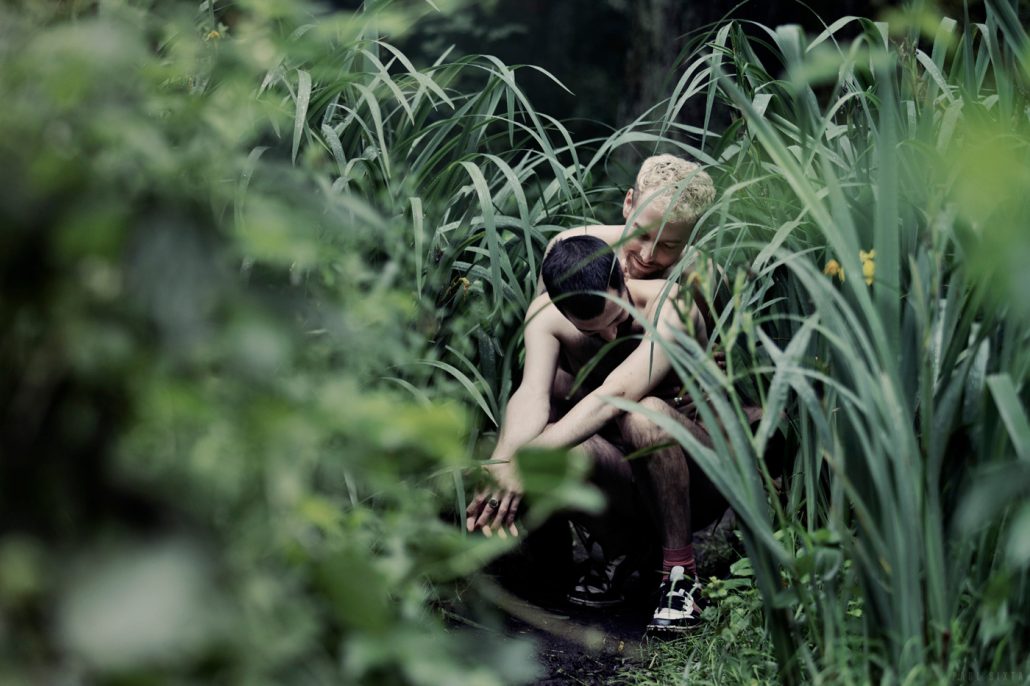
Talking about what we need is the most challenging. We tend to do it when an issue comes up.”
Jonathan
Catapulted into intimacy from the get-go. Uncomfortable for Johnathan, what was going through your mind Manu?
M: “It was exciting. [laughs] “Yea, for sure, as dancers we are pretty used to being close to somebody, also someone that we don’t know. Last week I was traveling with my straight best friend, sharing a very small bed together and it was no big deal. Jonathan was a new person to know. I was kind of pushing for it if I have to be honest. [laughs] Because the decision of the room happened before.”
J: “Really? All this time… For four years I thought it was a coincidence.”
M: “It was manipulated.”
J: “We had seen each other before when I was working on another production in the same building. I thought Manu was completely out of my league, but very… hot, haha. I was with my boyfriend at that time, the first relationship I ever had, already six, seven years then. Settled for life already, or that’s what I thought. Because it had also started to scare me. Manu came, and things…”
M: “I messed things up.”
How many nights in one bed did it take before stuff started happening?
M, smiles: “Zero.”
Haha. And you were riddled with guilt, Jonathan?
J: “During rehearsals, already I had to stay a week at his place. That’s when things happened first. Then I had to go back to my boyfriend for some months. Indeed I felt guilty. I was telling myself I made a mistake and kind of going back to what I was having. At the same time, I also felt: maybe it meant something. A few months later it happened again with Manu, and it kind of made things clear.”
You were super young when you engaged in that first relationship?
J: “Yes. We were living together, everything was stable. My future seemed so clear and that was starting to scare me. If it hadn’t been for Manu, I don’t think I would have stayed with my ex. It was too early for that kind of commitment. When I began my studies in the Netherlands, my first teacher said about my ex: ‘Don’t think that you and he are going to be together.’ I was defensive, explaining that I was in a wonderful relationship, but my teacher insisted: No, no, no. When you’re going to start touring and working with other people – especially dancers, he said – you’re not gonna keep this relationship.”
Haha, you were already warned for the dancers. What an odd thing to say though for a teacher.
J: “I was offended in the moment, but in retrospect, he was right. If you enter this kind of life, it is difficult to stick to a relationship that is very at home, very stationary. It is not easy to match that with being all over the place. Every project we meet new people, experience new places. Now, we both have that life, we both understand it.”
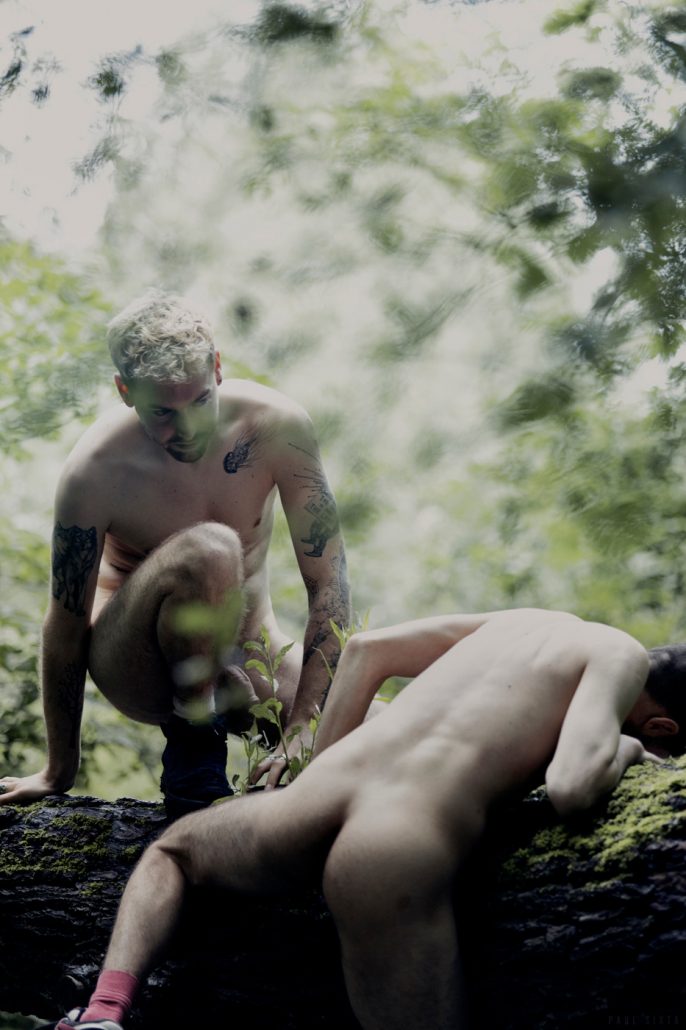
Let’s say I have my original way of starting a conversation. It involves breaking objects.”
Manu
Manu, you were single at the time?
M: “I was single and totally rock and roll when I met Jonathan. It was a bit of a period of being impulsive, not spending too much time thinking. The internship was ending and that reflected in me, it was a time to be bold.”
J: “For months Manu and I were behaving like boyfriends while telling each other we were not. Because somehow we both really didn’t want it. At some point everyone saw us as a couple, it started to become silly. So we gave in.”
What made you hesitant?
J: “I didn’t want to go back right away into a situation that I had just left, I wanted to explore. Pretty soon it became clear things were different with Manu. For the first time I realized: ah, we can choose what our relationship will look like. For me or for us. That I found very exciting. As long as we want to stay together, we can also define what being together means for us. Manu and I each have our own house, we don’t live together. I used to think: after a while, you’re supposed to do that. But it’s up to us, and with Manu, I can really reflect on those things.”
We’re brought up thinking our life has to look a certain way and spend plenty of time trying to fit that.
J: “Yes. Being gay in a way is an advantage. You’re already not doing it as you are supposed to. That makes it easier to start the conversation: then how are we going to shape it? What I really learned: also that can change. The subject is very much: what kind of relationship do I want with you right now? One year from now, maybe our needs are different. Maybe we live in different cities, further apart or closer, our jobs might change. It’s nice to be able to adapt the relationship to our needs.”
Those are talks that you have?
M: “Normally we go with the flow. If something needs more attention or is a bother, we talk about it. During the pandemic, we were actually living together. For four months we were…”
J: “Extremely peaceful. We walked in the forest.”
M: “And playing board games.”
J: “Which is not how we normally are together. But in this period, apparently, it was what we both wanted and it was really nice.”
Was it the first time that you really lived together?
Making art together creates the space to know each other on an intuitive level, beyond what we say and do.”
Manu
M: “Sometimes we have jobs in each other’s cities, so it happens that I spend several weeks at his place or he at mine.”
J: “For me, it is important to have my own space. When Manu finishes a production and needs to relax while I’m preparing for a premiere, those energies don’t match. Talking about such things is the most challenging. We tend to do it when an issue comes up. But it is my ambition, and I find that most precious thing about the relationship, to learn together how to communicate, also about uncomfortable things.”
Before it becomes an actual issue: you sense it, so you might as well address it before one of you explodes?
J: “Yea. Because it is very clear to me, every time we talk, things are better. We are always stronger after that talk and I love that. But we both find it difficult – I think a lot of people – to talk about complicated feelings or things like jealousy.”
Or even ambiguous feelings, you don’t always know exactly what you feel. How are you different in that?
M: “I’m the one who doesn’t talk always easily about complicated things, I think.”
J, hesitant: “Maybe, with you, that is a bit deeper, and perhaps it also comes from being born into an Italian Christian situation? But I think we both find it difficult to talk.”
Is it generally you who starts a conversation, Jonathan?
M: “I’d say so.”
J: “Either me that starts the conversation or you that… freaks out.”
[both laugh]
M: “Let’s say I have my original way of starting a conversation. It involves breaking objects.”
You go all-out Italian on him?
M: “Not only in romantic relationships, in relationships in general. I don’t freak out every day, but when it happens, somehow it helps me to calm down if I break a few things, drop some things on the floor. Then I can talk more calmly, haha.”
J: “I was driving him to the hospital last time it happened.”
M: “I kicked a piano. Many times. I thought my right foot was broken.”
J: “And he’s a dancer.”
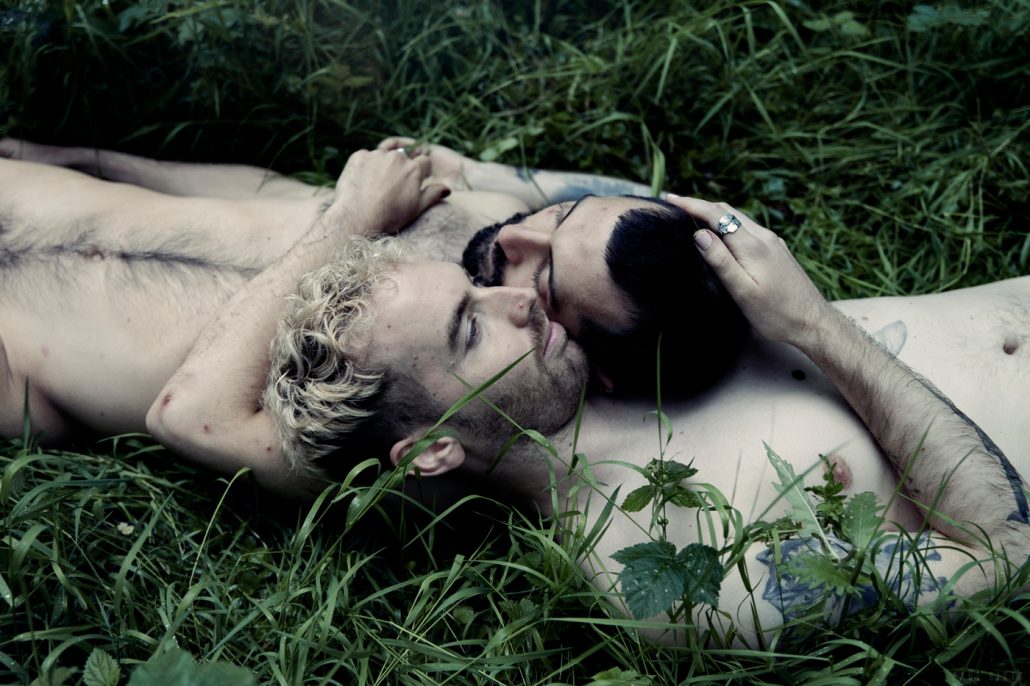
I really, really admire Manu’s work. I fell in love with his dance before I fell in love with him.”
Jonathan
After their studies, Manu and Jonathan both developed into independent makers. Manu asked Jonathan to write the music for his first dance piece, Through the Vally, three years ago. A collaboration that they continued in Manu’s second piece, Killer Wave, in which they also performed together.
A romantic relationship has its dynamics, a professional relationship has its dynamics. How is it to have that mixed in with your creative process?
J: “In bed, we talk about what we want to make. During dinner, we discuss projects, comment, or ask each other suggestions. Our relationship can also get in the way. Sometimes I sense that we are not talking to each other like we would with a neutral director or choreographer. I realize: ‘Okay, now we’re boyfriends’. When we’re working, we’re working. We’re also supposed to communicate in that way.”
Is it difficult to navigate those sensitivities?
J: “Often people don’t even know that we are together. When at night we have drinks with the cast, it’s when they find out and they had no idea. I think we’re managing to keep it professional.”
Does working together make your relationship stronger? You get to know each other through your work, an artistic expression that is coming from inside of you.
M: “It creates the space to know each other on an intuitive level, beyond what we say and do. Because that is how we create art. So, yes, I feel, listening to the music Jonathan composes, that I get a glimpse of his inner world and the other way around. It is quite special.”
Being naked in front of a camera was really huge for me. It felt liberating, I got more comfortable with myself.”
Jonathan
J: “I really, really admire Manu’s work. I think I fell in love with his work before I fell in love with him. First I saw him dancing. Still, it’s very often his work that reminds me how amazing he is. We are working on a new video together. In the weeks leading up to the shoot, sometimes we had friction in me trying to micromanage how he was going to work in my project.”
M, laughs: “I’m allergic to micromanaging.”
J: “And I’m a control freak. The moment we were on set with people and Manu started doing what he does, I was like: what was I thinking? Because then I see it again. And I see it every time when he’s on stage or working with performers.”
To Manu: “I think you also have this with my music. It’s a really nice foundation for a relationship. Because what we make, is so personal, so me, so you, so us. The fact we admire that in each other makes it really strong.”
M: “The reason why people in a studio don’t realize we’re in a relationship, is because we’re in love with our work. When we enter the space it is really about that. Sometimes at the end of a day of rehearsing together, it is like I’m seeing Jonathan for the first time.” [Laughs] “I ask him: how was your day?”
J: “Music is my first relationship. I’ve been with music since I was three and I’m building it forever. It is always going to be there. Often work comes first, we both understand that from each other. If we need each other, we also make that happen. But I will never get in the way of his dance. If we have to move to the other end of the world for an opportunity, I’m never ever gonna try to stop that.”
M: “I think in general our relationship is about not standing in each other’s way but supporting each other’s wishes.”
You are currently working on a music video together for your new track, Grindr Diaries.
J: “The song is about cruising and hook-up culture as we know it today. For the video, we wanted to portray that in an old skool way. Before I came out, I was already dating strangers through old-fashioned chatrooms like Bullchat. Then the apps came. How people behave in hook-up settings, through Grindr but also at cruising places, clubs, it fascinates me. The body language, the awkwardness. In a sauna, I could watch it for hours. I was not even that interested in the sex, more in how all these people know how to behave. The codes that exist, gazing that is so specific. Try and explain all that to a straight friend. There is a dark and dangerous side to it, it has free and liberating, and fun aspects. Sometimes the danger and the fun come really close together. Lots of people don’t even know it exists. A parallel world in the dark that I find strange, fascinating. It is beautiful also, and important. With this clip, in an artistic way, I want to show how cool it is.”
How did the shoot go?
J: “The thing is: I’m not an experienced director. I have a lot of insecurities. The challenge was to understand: what can I ask from people? The topic was sex, sexual tension. I selected six people who I know work with their body and sexuality as artists, they use it. For half of the day, we did improvisations. How comfortable, naked, uncomfortable, close can we get? Can we create the right tension? The performers were very diverse, the openness of these people to explore each other was beautiful. In the end it made the story about more than sex, it is about connecting different realities. Manu was the one who managed to really bring us together as a group.”
Manu: “It’s a nice challenge to create a choreography that expresses sex without it being cheesy. I’m in general very interested in the theme, and somehow I always get asked or involved in things that have to do with sexuality. Sex brings with it all these taboos. I really like to unwrap that so people who see it can also feel liberated. The advantage was that the performers didn’t know each other, the not knowing was real.”
In my work I find that sexuality is a very good entry point for bigger and more existential topics.”
Manu
You work with filmmaker Paul Sixta, who also contributes the photos to this article.
J: “Yes. I had done a shoot with Paul by myself first, he approached me on Instagram. Being naked in front of a camera, it was really huge for me to do that. It felt liberating, I got more comfortable with myself. Taking that step may have to do with seeing Manu perform naked so many times. Ever since the beginning, he’s always…”
M: “Not always.”
J, laughs: “Almost always naked on stage and in rehearsals. It seemed nice to be in peace with yourself, so you can be naked with other people, even people you don’t know. It was an ambition of mine to get there. Having that experience with Paul, and knowing that he does amazing dance videos, he was the perfect candidate.”
You’ve been working in music for a good couple of years, Jonathan. Why did you decide last year to set up your own project?
J: “It grew from the pandemic and having all this time to think: what do I really wanna do? For five years I’ve been working for other people, as part of a creative team. Music, theatre, dance pieces. It was always someone else’s vision and my music had to support that. Doing my own shit was always at the end of my priorities. I realized: I also want to say things about the stuff that keeps me awake at night. So I started an art-pop alter ego. I feel that with my own music – and how I want to develop the performance concept, how want to connect to my audience – I can communicate about that. I needed those five years of inspiration, seeing how it works. Experiencing how directors deal with movement, light, set design, costumes, all these choices that help to support your message. I was able to make a lot of steps during the pandemic. Most importantly, I understand now which my messages are.”
Manu, why is it that you get dragged a lot into work that deals with sex?
M: “It’s not that sex is the base of my work. My first piece was about morality. Coming from quite a conservative environment, I find that sexuality is a very good entry point for bigger and more existential topics. And I think it’s needed, to somehow take the taboo out of it. If I can contribute to lightening the subject, I do that.”
J: “Something I heard you say a lot: when you watch someone dance, you want to see a naked body. Not a skin-colored suit that covers it, as if it needs to be hidden. You want to show the body as it is, apart from sex.”
M: “Yes. It is a misconception that a naked body is related to sex. While actually, you can make a very sexual production with all clothes on, and a very non-sexual thing with a naked body. But I get where the thinking comes from, that’s why I think we need to bring it on stage.”
J: “It’s a pity so many of us find it so difficult to be naked.”
M: “It was problematic for me too. I learned. I kind of had to, for a piece. And it was really liberating to feel comfortable being naked. Everybody should try.” [laughs]
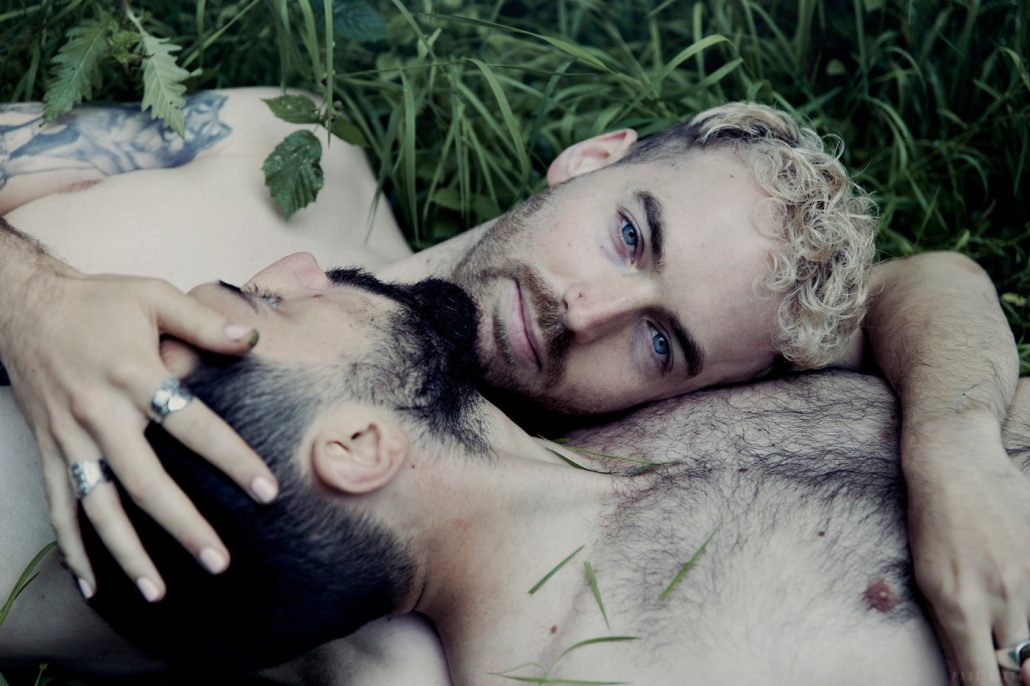
Cruising and hook-up culture is so specific. Try and explain all that to a straight friend.”
Jonathan
Did the pandemic shift anything in your thinking, Manu?
M: “I took some of the best decisions for my life and career so far. I broke free. I had opened a company in Groningen, for which was creating work with other collaborators, but I arrived at a point where it was actually limiting me. I wanted to focus on becoming an independent maker.”
J: “For months Manu was clearly not happy in his own company. I think it was an extremely brave move to say: I need to be on my own again.”
To Manu: “You had not freelanced before. Now you are doing your own projects, you are enjoying so much more. It is clear that it was a good decision.”
The thinking is often: you give up stability. But how stable can you be when you feel miserable?
M: “For me, knowing exactly what to expect is a way that doesn’t really work for me. It kind of turns me off. Somehow, I believe that by just believing it, it happens. So far, I don’t feel worried. I see that projects keep coming.”
A beautiful mindset to have. It requires a certain trust, that you put in yourself rather than in a contract.
M: “Yes. It took me practice to gain that.”
J: “That is what Manu thought me, trusting intuition, the universe. And when you learn how to trust that, it actually works better. I’m not sure how, but it works.”
Grindr Diaries is the third installment of a musical exploration by Jórma. His first two videos are very worthwhile checking out, too. Manuel is a freelance dancer, choreographer, and theatre-maker. The video for Grindr Diaries was filmed by Paul Sixta, who also shot the photos for this article.

TOGETHER. Tell us how you make it work.
///////////////////////////////

